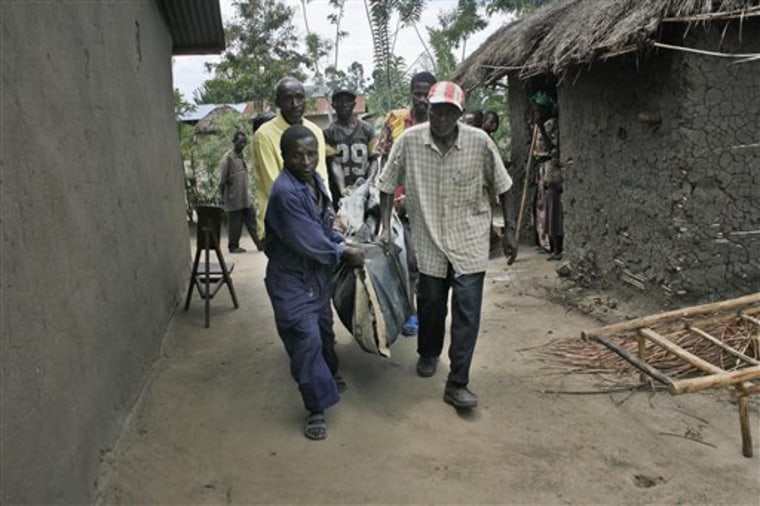African leaders criticized the world's largest United Nations peacekeeping force Friday for failing to protect civilians and end the violence that is convulsing eastern Congo and threatening to spread.
U.N. Secretary-General Ban Ki-moon acknowledged the 17,000 troops were "stretched to the limit." He spoke in Nairobi at a summit with African leaders that included Congolese President Joseph Kabila and Rwandan President Paul Kagame. Officials said rebel leader Laurent Nkunda, who's spearheading the Congo offensive, was not invited.
A summit communique said regional nations should send peacemaking forces if necessary and "not stand by to witness incessant and destructive acts of violence by armed groups against innocent people."
Both sides have been accused of killing civilians. New York-based Human Rights Watch said at least 100 have died, while others say the civilian toll is undetermined.
Meanwhile, fighting raged anew in Congo between the army and rebels outside Goma near Kibati, where about 45,000 refugees from the rebellion in mineral-rich eastern Congo have taken refuge. Thousands fled toward the relative safety of Goma.
The French aid group Doctors Without Borders reported fighting in the Goma-area towns of Rutshuru and Kiwanja, where the charity tried to send staff who had to turn back. The aid group said Rutshuru hospital was full of displaced civilians.
Battle near Goma
Ban denied an earlier U.N. report that Angolan troops had joined Congolese soldiers battling rebels near Goma, an account that raised new fears the conflict could spread in the region.
Congo asked Angola for support Oct. 29, as rebels led by Nkunda, a Tutsi former general, advanced toward Goma, capital of North Kivu province near the Rwandan border.
On Friday, a U.N. official and a Uruguayan peacekeeping officer said that an unspecified number of Angolan troops arrived four days ago. The two officials spoke on condition of anonymity because of the subject's sensitivity.
During the summit, Ban said he knew nothing about Angolan troops in Congo. "I have no information about the Angolan troops participating in this at this point."
In New York, U.N. Assistant Secretary-General for Peacekeeping Edmond Mulet suggested some people may have mistaken Congolese government troops who had trained in Angola, and therefore spoke Portuguese, for Angolan troops.
There is widespread concern that the involvement of Angolans could spread the conflict beyond Congo's borders. Congo's 1998-2002 war drew in more than half a dozen African nations.
Ethnic hatred
Rebel leader Nkunda went on the offensive Aug. 28 and brought his fighters to the edge of Goma last week before declaring a unilateral cease-fire, which has since largely crumbled. Tens of thousands of civilians fled the fighting and an unknown number were killed or injured.
The conflict is fueled by ethnic hatred left over from the 1994 slaughter of a half-million Tutsis in Rwanda, as well as from Congo's civil wars.
Nkunda claims the Congolese government has not protected ethnic Tutsis from Rwandan Hutu militia members who escaped to Congo after taking part in the 1994 Rwandan genocide.
Kudura Kasongo, a spokesman for Kabila, said the U.N. mission in Congo, known as MONUC, has not fulfilled its mandate.
"If they have failed, why are we being left alone with that burden?" Kasongo asked.
Ban said the Congolese army must be strengthened considerably to respond to the situation.
"We must put the cycle of violence behind us," he said. "This crisis could engulf the broader sub-region."
Kagame has also condemned the U.N. peacekeeping mission as a failure.
"What is the use of this mission?" he asked in Rwanda on Thursday, adding that more than a billion dollars is spent on it annually.
Kabila and Kagame also had a rare face-to-face meeting for about five minutes Friday, the spokesman said. Kabila's government accuses Kagame's Tutsi-led government of supporting the Congolese rebels.
Several journalists missing
A spokesman for the U.N. mission, Madnodje Mounoubai, was quoted by U.N. Radio Okapi as saying peacekeepers were doing what they could to protect civilians.
"When the fighting started, the civilian population, en masse, came to find refuge around the MONUC base," he said "So, the first thing that MONUC did was to assure these people who arrived around its base their protection and security."
Also Friday, a U.N. official said several journalists who were in the conflict zone, including four foreigners, are missing or held hostage. Speaking on condition of anonymity because of the sensitivity of the issue, the official said three or four journalists taken hostage by militiamen were handed over early Friday to Congolese army troops and U.N. peacekeepers are trying to reach them, the official said. Three other European reporters have been missing for 72 hours.
